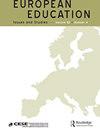一系列矛盾:国家强制与苏俄青年的教育经历,1931-1945
IF 0.9
Q4 EDUCATION & EDUCATIONAL RESEARCH
引用次数: 1
摘要
本文以学生和教师的口头和书面证词为基础,考察了1931年至1945年斯大林统治下的俄罗斯学龄儿童的生活教育经历。国家独自决定全国学校的结构和课程。然而,苏联的年轻人、他们的父母和老师对该中心的倡议做出了回应,他们既拥抱又蔑视创造新社会和人类的企图。因此,他们立即阻碍、塑造并推进了国家利用学校作为工具来创造苏维埃变体的现代性的计划。本文章由计算机程序翻译,如有差异,请以英文原文为准。
A Host of Contradictions: State Compulsion and the Educational Experience of Soviet Russia’s Youth, 1931–1945
Abstract Based on oral and written testimony of pupils and teachers, this essay examines the lived educational experience of the school-age cohort of children in Stalin’s Russia from 1931 to 1945. The state alone determined the structure and curricula of the nation’s schools. However, Soviet youngsters, their parents, and teachers responded to the center’s initiatives in ways that both embraced and defied the attempt to make anew society and humans. They thereby at once hindered, shaped, and advanced the state’s schemes to use the school as an instrument for the creation of a Soviet variant of modernity.
求助全文
通过发布文献求助,成功后即可免费获取论文全文。
去求助
来源期刊

European Education
EDUCATION & EDUCATIONAL RESEARCH-
CiteScore
1.20
自引率
0.00%
发文量
5
期刊介绍:
uropean Education is published in association with the Comparative Education Society in Europe (CESE). It is an international peer-reviewed journal devoted to original inquiries and dialogue on education across the member states of the Council of Europe. Established in 1969, the journal features articles on education in individual member states, comparative studies on education across Europe, as well as the impact of European education initiatives globally. The journal especially encourages theoretical and empirical studies, interdisciplinary perspectives, and critical examination of the impact of political, economic, and social forces on education. European Education includes reviews of books and educational films, including those published/produced in English and other languages.
 求助内容:
求助内容: 应助结果提醒方式:
应助结果提醒方式:


